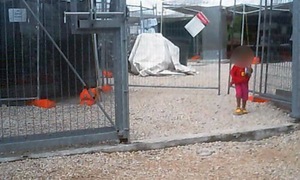
The inhumane treatment of refugees and asylum seekers by successive Australian governments must end, and doctors should not feel afraid to speak out about their treatment, the president of the Royal Australasian College of Physicians (RACP) has said.
Nicholas Talley said woeful healthcare standards for asylum seekers had prompted the release of the college’s first position statement on refugee and asylum–seeker health.
“Our fellows have been inside the detention facilities,” Talley told the RACP’s congress in Cairns on Monday. “We have treated refugees and asylum seekers during their detention and after their release into the community. These people are not numbers, they are our patients.
“As physicians, we are duty bound to speak on behalf of our patients – especially since their human rights are increasingly seen as optional.”
For almost two decades, the college had argued Australia’s policies for asylum seekers, such as mandatory and indefinite detention, breached human rights and caused significant harm, Talley said.
He told Guardian Australia detention had to end, and he hoped by releasing official policy recommendations targeted at both sides of politics, the government would act.
“Their policies are simply inhumane,” Talley said.
“Despite our advocacy to date we haven’t had the impact we feel we need and based on our fellows’ involvement in the management of children in particular, we are still deeply concerned that the changes we have advocated for haven’t been put in place.”
Guardian Australia has contacted the offices of the minister for immigration, Peter Dutton, and the assistant minister for immigration, Michaelia Cash, for their response to the policy recommendations.
Among many things, the policy document calls for the government to take urgent action to provide more rigorous health assessments for asylum seekers on arrival; better access to healthcare for asylum seekers and refugees in the community; increase support services for refugees; and to immediately end mandatory detention, which they say is particularly harmful to children.
Professor David Isaacs, a consultant paediatrician who heads the Refugee Clinic at the Children’s hospital at Westmead, told Guardian Australia he had nightmares after treating children and their parents detained at Nauru.
Doctors were being left mentally scarred by what they were seeing, he said.
“The people there are in such distress and we saw children as young as six self-harming – I’d never seen that before in my entire life,” he said.
“Their parents were in such a state, they felt they had tried to run away to make their family safer and instead, they had made their situation worse.
“My colleague and I who went had nightmares for a week or two afterwards and we only went there for five days … we felt like we were party to some kind of torture, because we couldn’t take them away. All paediatricians who work with asylum–seeker children recognise that they are deeply traumatised by what has happened to them and we should do everything in our power not to make that trauma worse.”
He said putting children in detention increased the risk of psychological trauma and if the period of detention was uncertain, it created an “impossible” situation for families.
“We wouldn’t even do that to criminals, and it’s not right that Australia is doing this to these people,” he said.
Speaking to Guardian Australia from an infectious diseases conference in London, Isaacs said his peers overseas had been questioning him about Australia’s treatment of asylum seekers.
“Doctors overseas are just appalled at Australia’s inequality, internationally, our policy towards asylum seekers is seen like apartheid.”
Earlier this month, Isaacs told a Senate inquiry into allegations of sexual assault and conditions on Nauru, asylum–seekers’ living quarters were crammed, mouldy and provided no privacy; that women had insufficient sanitary towels and used clothes and material to soak up the blood; and that he spoke with one asylum seeker who alleged she had been sexually assaulted by a cleaner.
To coincide with the release of its policy recommendations, the college also released a video featuring Dr Karen Zwi, paediatric adviser to the Australian Human Rights Commission national inquiry into children in immigration detention.
“The evidence is in, the evidence is irrefutable, detention is harmful,” she said.
“The first time I went to Christmas Island [detention centre] I was deeply shocked. I was not expecting that children in an Australian environment would be detained in such conditions.
“If they feel safe and comfortable and the healthcare system allows them to trust doctors and nurses, the relief is evident.”
